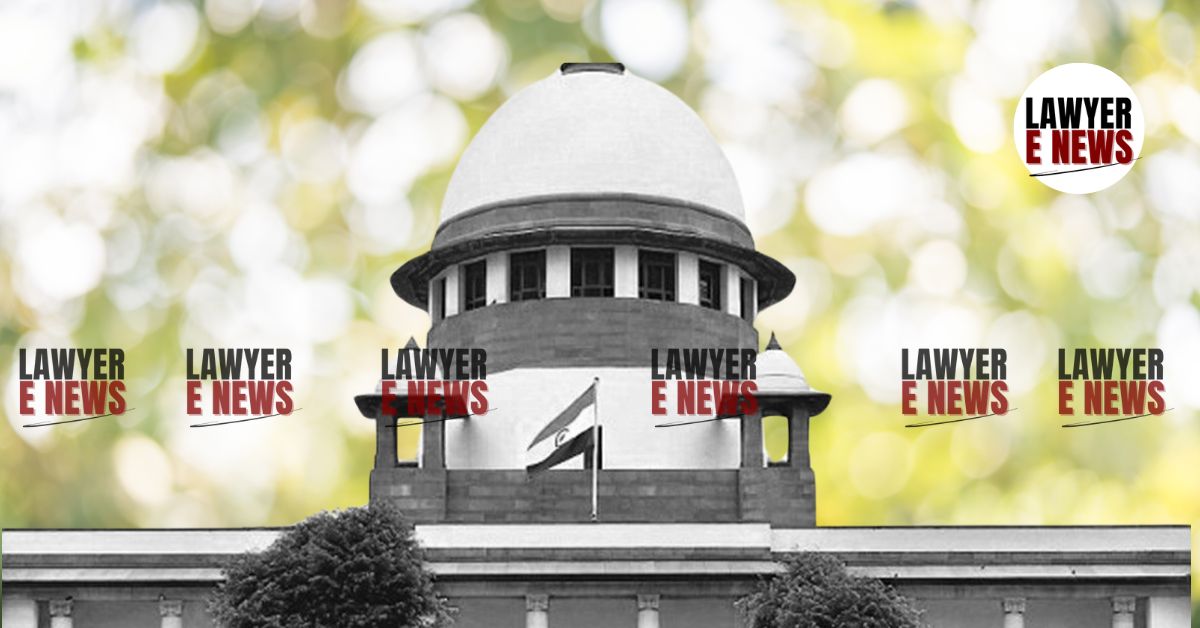-
by Admin
16 February 2026 1:47 PM



“Serving Charge Sheet Without Waiting for CVC Advice Was Arbitrary and Mala Fide”: Supreme Court of India quashed the disciplinary proceedings initiated against a Deputy General Manager of Union Bank of India, holding that the charge sheet issued without obtaining first-stage advice from the Central Vigilance Commission (CVC) violated the very disciplinary protocol the Bank had itself invoked.
The Bench of Justice Abhay S. Oka and Justice Augustine George Masih ruled that once the Bank admitted the necessity of consulting the CVC under Regulation 19 of the 1976 Regulations, it could not bypass or ignore the process. The charge sheet, served just days before the officer’s retirement, was thus quashed, with the Court holding:
“Once the first-stage advice of the CVC was called, it was the duty of the Bank to consider the advice and then take a decision to serve the chargesheet. Thus, the actions of the Bank are mala fide and arbitrary.”
A.M. Kulshrestha, a career banker who joined Union Bank of India in 1984, rose to the rank of Deputy General Manager in 2016 and was due to retire on June 30, 2019, after 34 years of unblemished service.
However, on August 21, 2018, the Bank placed him under suspension, alleging that during his tenure as Regional Head at Meerut, he sanctioned large credit limits to newly incorporated firms without proper diligence. Months later, the Bank issued two show cause notices (in January and March 2019), but no charge sheet followed.
Kulshrestha approached the Allahabad High Court, where the Bank defended the delay in initiating proceedings by stating—under sworn affidavits from both its General Manager and Executive Director—that the matter involved a vigilance angle, and as per Regulation 19 of the Union Bank of India Officer Employees’ (Discipline & Appeal) Regulations, 1976, they had referred the matter to the CVC for first-stage advice, which was still awaited.
Despite these affidavits, the Bank served him with a charge sheet dated June 10, 2019, just 20 days before retirement, and before receiving CVC’s advice, which ultimately arrived only after June 21.
“Once You Say CVC Advice Is Necessary, You Cannot Pretend Otherwise”
The crux of the dispute turned on Regulation 19, which reads: “The Bank shall consult the Central Vigilance Commission wherever necessary, in respect of all disciplinary cases having a vigilance angle.”
The Bank argued that the provision was directory, not mandatory, and that consultation could follow initiation of proceedings. But the Court flatly rejected this, noting that the Bank had already:
Declared in court affidavits that the matter involved a vigilance angle
Stated on oath that a charge sheet would be issued only after receiving the CVC’s advice
Admitted that they had sought advice on May 17, 2019, but served the charge sheet on June 18, without waiting for the advice
The Supreme Court held this conduct legally impermissible, observing: “Once the respondent-Bank accepted the necessity of seeking first-stage advice from the CVC, it was not open to serve the charge sheet without receiving and considering that advice.”
“Disciplinary Action Was Timed to Deny Retirement Benefits”
The Court was equally scathing about the timing of the action. After 34 years of clean service, Kulshrestha was suspended just ten months before retirement, then served a charge sheet 12 days before superannuation, in violation of the process the Bank itself initiated.
Calling the conduct “mala fide and arbitrary”, the Court observed:
“Although it was necessary to take the first stage advice of the CVC, the advice was sought only as late as 17th May 2019. Twelve days before reaching superannuation, a charge sheet was served… despite the specific statement made on oath that it would only be served after receipt of CVC advice.”
The Court concluded that this last-minute charge sheet was clearly intended to deprive the appellant of his retiral benefits.
“Mandatory vs Directory Is Irrelevant When the Bank Admitted Its Own Obligation”
While the High Court had upheld the charge sheet on the ground that Regulation 19 was not mandatory, the Supreme Court disagreed. It held that this debate became academic in this case, because:
“The Bank itself acknowledged that in the facts of the case, it was necessary to seek first-stage advice from the CVC.”
Therefore, the High Court had erred in entering into a legal interpretation that had already been foreclosed by the Bank’s own stand in court.
No Resumption of Proceedings After Six Years
The Court also refused to permit the resumption of disciplinary proceedings, noting that nearly six years had passed since Kulshrestha’s retirement and that the process itself had been invalid from the outset.
“Now, at this stage, it will be unjust to allow the respondent-Bank to resume disciplinary proceedings. Almost six years have passed since the superannuation of the Appellant.”
The Supreme Court quashed the charge sheet dated June 10, 2019, and all consequential disciplinary proceedings. While the appellant was not granted back wages, he was awarded full retiral benefits as if he had retired normally on June 30, 2019.
“The Respondent Bank shall release all retirement benefits admissible on the basis that the appellant has superannuated as of 30th June 2019.”
The benefits are to be paid within three months from the date of the judgment.
This ruling serves as a firm reminder that disciplinary action cannot be sustained on arbitrary or procedurally defective grounds, especially when it appears to be calculated to punish an employee at the end of a long, otherwise spotless career.
“The appellant was sought to be victimised at the fag end of his unblemished career of 34 years.”
By holding the Bank accountable to the disciplinary protocol it had itself invoked, the Supreme Court has reinforced both fair process and administrative integrity.
Date of Decision: May 20, 2025
